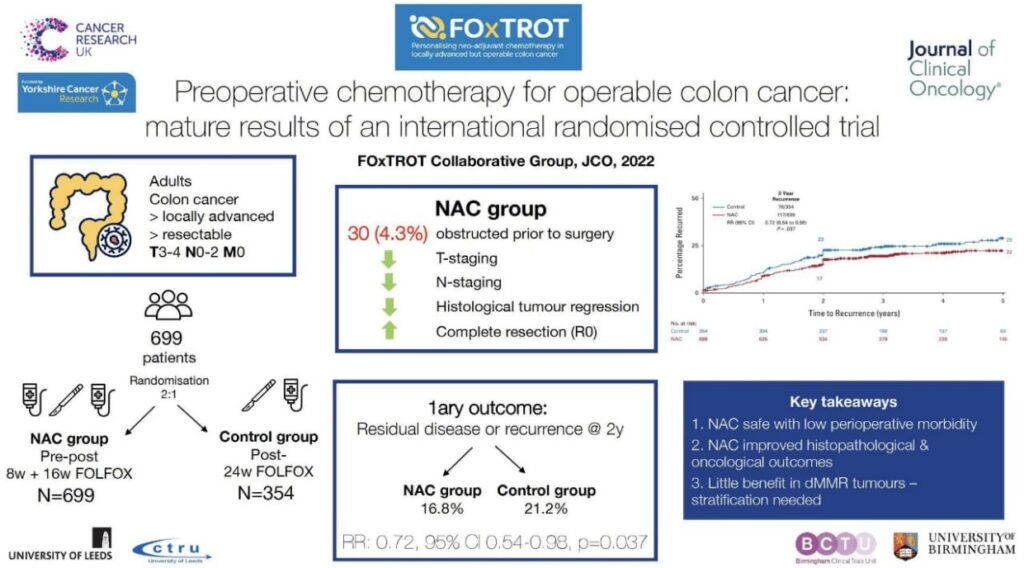Cancer Research UK Funded Trial Finds that Chemotherapy Before Surgery Cuts the Risk of Colon Cancer from Returning
March 23, 2023: Led by the University of Birmingham and the University of Leeds, the Cancer Research UK-funded FOxTROT trial found that giving colon cancer patients chemotherapy before surgery cuts their risk of the disease coming back, according to the results of a Cancer Research UK-funded clinical trial.

The FOxTROT trial showed that Giving the first 6 weeks of chemotherapy to colon cancer patients before, instead of after surgery, cuts their risk of cancer coming back within 2 years by 28%. 1,053 colon cancer patients from 85 hospitals in the UK, Denmark, and Sweden were involved in the study, led by scientists at the University of Birmingham and the University of Leeds.
Colon cancer patients were divided into two groups in the study. The first group received 6 weeks of chemotherapy, followed by surgery, then 18 weeks of chemotherapy. The second group had standard treatment for colon cancer, which was surgery first followed by 24 weeks of chemotherapy.
Through follow-up assessments, the scientists found that patients who had chemotherapy before surgery were significantly less likely to see their cancer come back, compared with those who got all their chemotherapy after surgery.
Scientists believe that giving chemotherapy to bowel cancer patients before surgery could be easily adopted by the NHS and other health systems across the world. At least 5,000 colon cancer patients in the UK, and hundreds of thousands of patients worldwide, could benefit from this treatment every year.
According to Professor Dion Morton, Professor of Surgery at the University of Birmingham, “In many parts of the world cancer treatments can be prohibitively expensive. We wanted to go in the opposite direction, testing a treatment that could be used on the widest possible group of patients.
Dr. Amrit Pipapra, Consultant and Colorectal Surgeon at Tata Medical Centre Kolkata stated, “Thanks to funding from Cancer Research UK, doctors in countries around the world will now be able to put these findings into clinical practice, saving many thousands of lives.”
According to Dr Rohin Mittal, Colorectal Surgeon at Christian Medical College Vellore, “patients who have colon cancer traditionally undergo surgery first, followed by chemotherapy. However, the recently published FOxTROT trial has shown that patients with colon cancer can benefit from a short course of chemotherapy before surgery. A six-week course of chemotherapy before surgery in these patients was found to be safe and improved complete tumor removal. It leads to a 28% reduction in tumor recurrence and residual disease, thereby improving outcomes. The degree of response to chemotherapy was a good marker for improved results.”
According to Dr. Rajkumar, Professor of Surgical Oncology at PSG Institute of Medical Sciences and Research, “the results from the recently published Foxtrot study show that chemotherapy given before surgery improves success rate in patients with advanced bowel cancer. This is a significant new advancement in the treatment of bowel cancer patients“.
Dr. Sundeep Saluja, Professor of Surgical Gastroenterology at GB Pant Hospital, New Delhi stated, Despite being considered a low incidence region. Colorectal is 5th most common cancer as per the GLOBOCAN 2020 report constituting 40 thousand new cases in males and 25 thousand new cases in females. It accounts for 5 percent of all cancers and 2.8 % of cancer-related death more than half being locally advanced diseases. As with other cancers, there is emerging evidence that giving chemotherapy before can reduce the chances of cancer coming back in colon cancer too. In addition, it might increase the chance of receiving treatment, especially in the older age group. Therefore timely treatment can save more lives.
Dr. Parvez David Haque, Professor and Head of Surgery at Christian Medical College and Hospital, Ludhiana, concluded, “timing is everything when it comes to treating colon cancer. The simple act of bringing forward chemotherapy, giving it before instead of after surgery, delivers some remarkable results.
Delivering chemotherapy before surgery could prevent recurrences of cancer without the need for expensive new drugs or technologies. It was especially encouraging to find that patients who had chemotherapy before their surgery suffered fewer surgical complications. Scaling up this treatment worldwide, including in low and middle-income countries, could transform cancer care and save many thousands of lives.”


